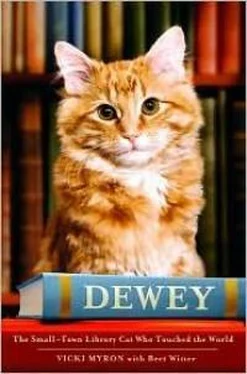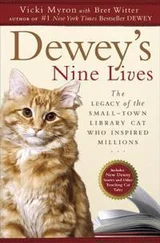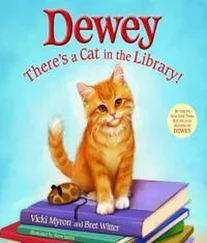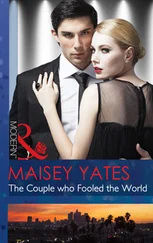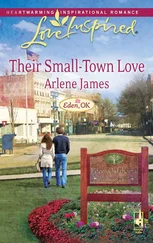A year after Dewey’s death, my health finally caught up with me. It was time, I knew, to move on with my life. The library was different without Dewey, and I didn’t want my days to end that way: empty, quiet, occasionally lonely. When I saw the book cart go past, the one Dewey used to ride on, it broke my heart. I missed him that much, and not just once in a while, but every day. I decided to retire. It was time. More than 125 people attended my retirement party, including many from out of town I hadn’t spoken with in years. Dad read one of his poems; my grandkids sat with me to greet well-wishers; two articles ran in the Spencer Daily Reporter thanking me for twenty-five years of service. Like Dewey, I was lucky. I got to leave on my own terms.
Find your place. Be happy with what you have. Treat everyone well. Live a good life. It isn’t about material things; it’s about love. And you can never anticipate love.
I learned those things from Dewey, of course, but as always, those answers seem too easy. All answers, except that I loved Dewey with all my heart and he loved me in the same way, seem too easy. But let me try.
When I was three years old, Dad owned a John Deere tractor. The tractor had a cultivator on the front, which is a long row of shovel-like blades, six on each side. The blades are raised a few inches off the dirt; you drive the handle forward to put them in the ground, where they chop into the soil, tossing fresh dirt against the corn rows. I was playing in the mud by the front wheel of that tractor one day when Mom’s brother came out after lunch, threw the clutch, and started driving. Dad saw what happened and started running, but Mom’s brother couldn’t hear him. The wheel knocked me down and shoved me into the blades. I was pushed along by the blades, passed from one to the other, until Mom’s brother turned the wheel and the inside blade tossed me through the middle chute and left me lying facedown behind the tractor. Dad scooped me up in one motion and ran me back to the porch. He looked me over in amazement, then held me in his arms for the rest of the day, rocking back and forth in our old rocking chair, crying on my shoulder and telling me, “You’re all right, you’re all right, everything is all right.”
Eventually I looked at him and said, “I cut my finger.” I showed him the blood. I was bruised, but otherwise, that tiny cut was the only mark.
That’s life. We all go through the tractor blades every now and then. We all get bruised, and we all get cut. Sometimes the blades cut deep. The lucky ones come through with a few scratches, a little blood, but even that isn’t the most important thing. The most important thing is having someone there to scoop you up, to hold you tight, and to tell you everything is all right.
For years, I thought I had done that for Dewey. I thought that was my story to tell. And I had done that. When Dewey was hurt, cold, and crying, I was there. I held him. I made sure everything was all right.
But that’s only a sliver of the truth. The real truth is that for all those years, on the hard days, the good days, and all the unremembered days that make up the pages of the real book of our lives, Dewey was holding me.
He’s still holding me now. So thank you, Dewey. Thank you. Wherever you are.
Acknowledgments
To my agent, Peter McGuigan, for contacting me and believing there was a story to be told about Dewey’s life. Thank you, Peter, Hannah Gordon Brown, and everyone at Foundry Literary who worked so tirelessly to make this book bigger than I ever imagined.
To Bret Witter, who not only found my voice, but also became a friend and confidant through this process. Thank you, Bret, for making the book so well written. We were passionate about quality, and I think we achieved it.
To Karen Kosztolnyik, Jamie Raab, and Celia Johnson at Grand Central Publishing for fighting for the book even though they saw only a forty-five-page proposal. They believed in the story before it was even written. Thank you to Matthew Ballast, Harvey-Jane Kowal, Christine Valentine, and everyone at Grand Central: there would be no book without all of you.
To Dick Montgomery for being my lawyer and friend through all the legal “stuff,” and to his wife, Mary Jean, for all her support.
To the current and former Spencer Library staff who supported this project, sat through interviews, believed in me, and cared for Dewey over the years, including Jean Hollis Clark, Kay Larson, Joy DeWall, Sharon Joy, Audrey Wheeler, Cynthia Behrends, Paula Brown, Donna Stanford, Tammi Herbold, Jann Arends, Mary Jo Wingrove, Doris Armstrong, Kari Palm, Sheryl Rose, and Jackie Webster.
To all the other folks who agreed to be interviewed for this book and filled in my memory gaps, including Bob Rose, Kirby Schmidt, Mike Baehr, Jack Manders, Cathy Greiner, Esther Connell, Judy Johnson (both of you!), Marcie Muckey, Pat Jones, Dr. James Esterly, Verlyn Jipson, and Jodi Carlson. And to Louisville Metro Transcription, for transcribing those hundreds of hours of interviews.
To the board members who were in place when the decision was made to adopt Dewey, including Jack Manders, Mike Baehr, Mary Houston, Esther Connell, Bernie Keninger, JoAnn Lawson, Gail Peterson, Lee Lookingbill, and Grace Rindsig. They made a quick decision that would affect the library for years. I always had their full support; they gave me wings to fly.
To the current board members who gave me permission to write this book (on my own time), including Cathy Greiner, Esther Connell, Jim Morony, Sue Hitchcock, Roger Littlefield, Wayne Koppen, and Amanda Hoffman.
To the Board of the Friends Group who were always there when I needed them, especially Sandy Fleck, Marcie Muckey, and Trudy Elbert.
To my family, who helped me with the book and supported me through the process: Verlyn Jipson; Jodi and Scott Carlson; brother Doug (who edited film of Dewey), Merrillee, Verlyn, James, and Merrill Jipson; brother Mike and Monica Jipson, and daughter, Natalie DeHaven; sister Val and Don Bonney, Andrea, Josh, and Lindsay; and my niece MacKenzie Dunn. To my brothers David and Steve, whose lives were rich but much too short. To my mom and grandma Stephenson, who were strong role models for my life. And, most of all, to my delightful twin grandchildren, who make me laugh when the stress is too much: Hannah and Nathan Carlson.
To my uncle, Duane Jipson, who read everything he could get his hands on (including the encyclopedia) until his death at age ninety-four. His example of love, kindness, gentility, and education touched everyone, and especially me.
To Jim Fanning, former manager of the Montreal Expos baseball team and lifelong friend, for his support during the lean times and for believing that I could accomplish anything.
To Dr. Ron Kolegraff, friend and surgeon, for understanding my emotional needs when no one else could see it or discuss it.
To Treva Johnson, for helping me understand the needs of the disabled in the library long before the ADA Act was passed and for being my colleague on the Spencer ADA Council since 1991.
To Dewey fans, both near and far, for the thousands of letters, e-mails, gifts, and personal visits to see Dewey over the years, especially Harry and Rita Fein, from New York (who remembered every year for Christmas), Doreen Walker (his first British pen pal), Phyllis Lahti (founder of the Library Cat Society), and Gary Roma (filmmaker and comedian), who all believed in Dewey’s magic before he was famous.
To the city of Spencer staff and council who stood up for me and supported the library over the years, especially city council member David Scott, who volunteered his time as Board of the Friends attorney for over twenty-five years and went to bat for me many times. And to Bob Fagen, current city manager, who treated me with respect and understood the significance of this book for Spencer.
Читать дальше
